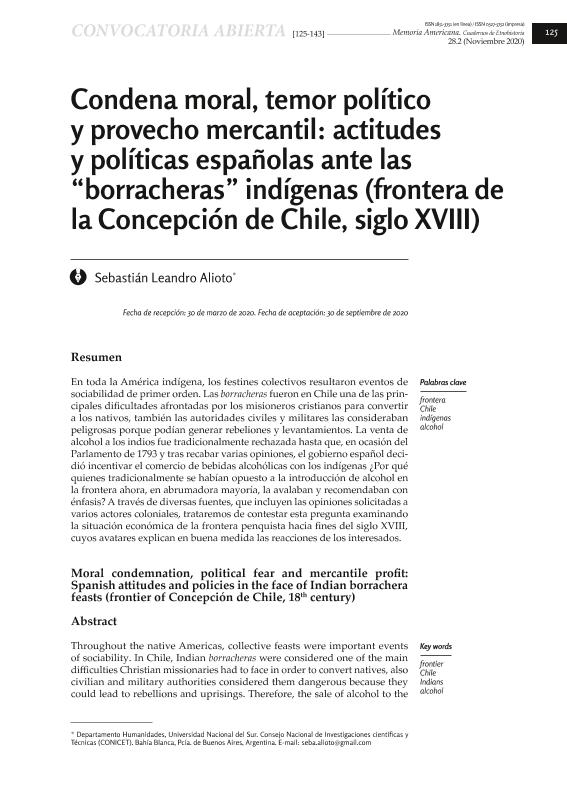Mostrar el registro sencillo del ítem
dc.contributor.author
Alioto, Sebastián Leandro

dc.date.available
2021-04-08T12:36:31Z
dc.date.issued
2020-11
dc.identifier.citation
Alioto, Sebastián Leandro; Condena moral, temor político y provecho mercantil: actitudes y políticas españolas ante las “borracheras” indígenas (frontera de la Concepción de Chile, siglo XVIII); Universidad de Buenos Aires. Facultad de Filosofía y Letras. Instituto de Ciencias Antropológicas; Memoria Americana; 28; 2; 11-2020; 125-143
dc.identifier.issn
0327-5752
dc.identifier.uri
http://hdl.handle.net/11336/129592
dc.description.abstract
En toda la América indígena, los festines colectivos resultaron eventos de sociabilidad de primer orden. Las borracheras fueron en Chile una de las principales dificultades afrontadas por los misioneros cristianos para convertir a los nativos, también las autoridades civiles y militares las consideraban peligrosas porque podían generar rebeliones y levantamientos. La venta de alcohol a los indios fue tradicionalmente rechazada hasta que, en ocasión del Parlamento de 1793 y tras recabar varias opiniones, el gobierno español decidió incentivar el comercio de bebidas alcohólicas con los indígenas ¿Por qué quienes tradicionalmente se habían opuesto a la introducción de alcohol en la frontera ahora, en abrumadora mayoría, la avalaban y recomendaban con énfasis? A través de diversas fuentes, que incluyen las opiniones solicitadas a varios actores coloniales, trataremos de contestar esta pregunta examinando la situación económica de la frontera penquista hacia fines del siglo XVIII, cuyos avatares explican en buena medida las reacciones de los interesados.
dc.description.abstract
Throughout the native Americas, collective feasts were important events of sociability. In Chile, Indian borracheras were considered one of the main difficulties Christian missionaries had to face in order to convert natives, also civilian and military authorities considered them dangerous because they could lead to rebellions and uprisings. Therefore, the sale of alcohol to the Indians was traditionally rejected until, on occasion of the Parlamento of 1793 and after obtaining several favorable opinions in this regard, the Spanish government decided to encourage the trade of alcoholic beverages with the natives. Why did those who had traditionally opposed the introduction of alcohol at the border now overwhelmingly endorsed and recommended it with emphasis? Through different sources, which include the opinions requested from several colonial actors, we will try to answer this question, examining the economic situation of the Concepción’s frontier towards late 18th century, whose avatars explain the reactions of the interested parties to a large extent.
dc.format
application/pdf
dc.language.iso
spa
dc.publisher
Universidad de Buenos Aires. Facultad de Filosofía y Letras. Instituto de Ciencias Antropológicas
dc.rights
info:eu-repo/semantics/openAccess
dc.rights.uri
https://creativecommons.org/licenses/by-nc-sa/2.5/ar/
dc.subject
FRONTERA
dc.subject
CHILE
dc.subject
INDÍGENAS
dc.subject
ALCOHOL
dc.subject.classification
Historia

dc.subject.classification
Historia y Arqueología

dc.subject.classification
HUMANIDADES

dc.title
Condena moral, temor político y provecho mercantil: actitudes y políticas españolas ante las “borracheras” indígenas (frontera de la Concepción de Chile, siglo XVIII)
dc.title
Moral condemnation, political fear and mercantile profit: Spanish attitudes and policies in the face of Indian borrachera feasts (frontier of Concepción de Chile, 18th century)
dc.type
info:eu-repo/semantics/article
dc.type
info:ar-repo/semantics/artículo
dc.type
info:eu-repo/semantics/publishedVersion
dc.date.updated
2021-02-10T16:58:01Z
dc.identifier.eissn
1851-3751
dc.journal.volume
28
dc.journal.number
2
dc.journal.pagination
125-143
dc.journal.pais
Argentina

dc.journal.ciudad
Buenos Aires
dc.description.fil
Fil: Alioto, Sebastián Leandro. Consejo Nacional de Investigaciones Científicas y Técnicas. Centro Científico Tecnológico Conicet - Bahía Blanca; Argentina. Universidad Nacional del Sur. Departamento de Humanidades; Argentina
dc.journal.title
Memoria Americana
dc.relation.alternativeid
info:eu-repo/semantics/altIdentifier/url/http://revistascientificas.filo.uba.ar/index.php/MA/article/view/7722
dc.relation.alternativeid
info:eu-repo/semantics/altIdentifier/url/https://doi.org/10.34096/mace.v28i2.7722
Archivos asociados
